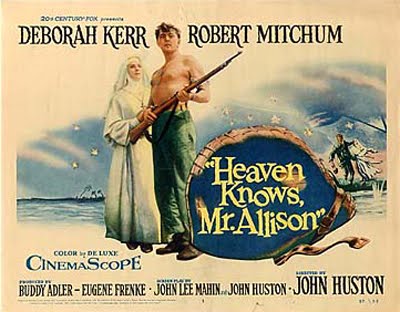Take two of Hollywood’s biggest stars and one of its finest directors, plonk them on a lush tropical island surrounded by rocky outcrops and rolling waves and arm them with an interesting script. What is the likely outcome? A damn fine movie, that’s what. Certainly in this case, it is.
I’m always fascinated by a film with a minimal cast. The actors involved have an even greater weight of responsibility than usual in that there’s no one else for the audience to focus on. On the other hand, there are no other performers to point the finger at if the thing tanks. For the actors, it must be both terrifying and supremely massaging to their egos. “You mean I’m in virtually every shot? Yes! That’s just what my fans will want. Of course I’ve got the talent and the screen presence to pull it off. How dare you suggest otherwise!”
Fortunately, the talent in this 1957 John Huston classic is without question. Robert Mitchum and Deborah Kerr – two gifted actors who apparently clicked immediately and went on to enjoy a lifelong friendship.
Mitchum plays US Marine, Corporal Allison who, after several days adrift in a rubber raft following a skirmish with the Japanese, finds himself washed up on an island in the South Pacific during the Second World War. A quick scout around reveals the island to be abandoned save for Sister Angela, a young nun played by Kerr, who has been there just a few days following a failed attempt to evacuate the priest already there. At first, Allison is relieved to be on the island where there is plenty of fish and fruit to eat and shelter from the tropical weather. He admits its not a bad place to wait out the war. But it isn’t long before a detachment of Japanese return to the island to set up a meteorological camp thereby forcing the Marine and the nun to hide out in a cave up in the surrounding hills.
There’s a wonderfully tense scene some time later when, sympathetic towards Sister Angela’s inability to eat the raw fish that he catches, Allison sneaks into the Japanese camp one night to steal something more palatable for her. It’s a beautifully shot and paced sequence by a master of cinematic storytelling – nothing fancy, nothing over the top, just measured excitement.
Meanwhile, the nights remind them that the war continues as flashes of naval gunfire light up the horizon. Then one day, the Japanese leave the island as quickly as they had come and the two celebrate their unexpected liberty. Allison gets drunk on a bottle of sake left behind by a Japanese officer and foolishly declares his love for Sister Angela as well as denouncing her holy devotion as a waste of time. His natural urges rising to the surface, he can’t see why their “Garden of Paradise” situation doesn’t become fully instinctive – if you know what I mean. Sister Angela runs away from him and spends the night outside in a storm, becoming sick as a result. The following morning, Allison, full of repentance and shame, finds her with a fever at the same time the Japanese return to the island. Once again they are forced to seek refuge in the cave. Allison, feeling completely responsible for Sister Angela’s condition, sneaks into the Japanese camp again to get blankets for her but he has to knife a solider to death when he is discovered. This alerts the detachment to an enemy presence and consequently, they begin a thorough search of the island.
To find out what happens next, I’ll encourage – nay recommend – you to watch the film yourself.
The two leads (and for ninety-five percent of the film you’ll see nobody else) are just perfectly cast and they own their time on screen. Between them, they’ve made many great movies and would go on to make two more together (The Sundowners and The Grass Is Greener – both in 1960). They’ve both given numerous wonderful performances as well over their careers and I don’t think either ever gave a better performance than they did here. Mitchum’s Marine is big and bruising, capable of dishing out death and yet kind and tender too; a simple man but a decent one; a product of a childhood he’d rather forget. Kerr’s nun is slightly naive but more uncertain, devout to her vows – of which the final one she has still to take – and yet teetering on the edge of uncertainty that she’s got what it takes to go all the way. Is she ready to forsake her womanhood for the greater calling? Both characters have chosen their paths and both have sworn oaths to tread them but will the time together on the island make a difference?
As if Mitchum or Kerr weren’t strong enough reasons to give this film a viewing, the director must surely tip the scales. From the moment John Huston sat behind the camera and gave us The Maltese Falcon in 1941, he revealed a certain brilliance and while Heaven Knows, Mr. Allison might not be his finest hour, it’s likely a film that many of his contemporaries would have wanted to helm. It was adapted from Charles Shaw’s novel of the same name by Huston and John Lee Mahin, a prolific screenwriter who penned numerous classics between the 30s and the 60s, among them, Captains Courageous (1937) and Showboat (1951). The island of Trinidad and Tobago where the film was shot was photographed by Oswald Morris, a cinematographer who’s career would span six decades and include a long list of gems like Moby Dick (1956) and The Man Who Would Be King (1975). Naturally, the setting is stunning and one can only imagine the times had by all on location. Deborah Kerr and the writing team of Huston and Mahin were nominated for Academy Awards and there were a handful of other nominations throughout that season but the only win it garnered was for Kerr at the ’57 New York Film Critics Circle Awards. Shame that, because while Mitchum earned a BAFTA nomination, his performance generally seemed to have been overlooked. But then being the kind of guy he was, he probably didn’t give a damn anyway.





 What they say:
What they say: 
